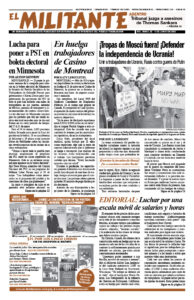MONTREAL — Over 500 dealers walked off the job at the Montreal Casino in their first strike ever, marching from the Ile Ste-Helene Metro station to the casino and setting up a large, loud and lively picket line May 21. They are members of Canadian Union of Public Employees Local 3939. The casino, the largest in Canada, is run by Loto-Quebec, which manages all four government-run casinos in the province, as well as the lottery and sports betting.
“At the blackjack table, we deal between 6,000 and 8,000 cards in a shift,” croupier Patrick Gagné told this Militant worker-correspondent. This has led to a high number of repetitive motion injuries, workers say. This issue, as well as abusive scheduling and the bosses’ demand to cut wages for new dealers, is at the heart of the strike.
Up to half the workforce has suffered injuries due to repetitive motion or back strain, said Denis Galy, local union president, who worked 21 years as a dealer. He said the government-run insurance board refuses to recognize many of them as work-related. Many strikers carried signs reading, “I’m wagering on my health.”
During the pandemic, dealers won the right to a half-hour break after one hour of work — time needed to rest their bodies. The casino now proposes to dock them 30 minutes pay daily for continuing these breaks. The union is demanding the half-hour breaks after every hour worked be maintained with no pay cut.
On top of a long-term decline in business, the COVID-19 pandemic hit the casino hard. “They’ve gone from 120 tables to under 60, and from a 24-hour operation to 18 hours a day,” Patrick Roux said. “They’ve replaced a lot of games with electronic tables or they’ve eliminated them. After 12 years of service, I’m back to the same schedule that I had when I started, working weekends.” At its height in 1995 the casino employed 1,200 dealers.
This didn’t prevent Loto-Quebec from turning a profit. In fact, the company announced it netted 900 million Canadian dollars ($703 million) in the last three months of 2021.
“I have 12 years seniority,” Gagné said. “I just came back last month after two years of not working during the pandemic, and I’m on call now. They give you three hours’ notice.” Better schedules are a key issue in the strike.
“The casino cut the workday,” Galy said. “You work more days now for the same pay.” Dealers often work six days just to go over 30 hours of work on their paycheck.
One of the casino bosses’ demands is to slash the wages of new dealers by 10%. “Young people are already quitting because there’s no hope of improvement,” said Gagné. Strikers all stressed their determination to refuse the proposed 10% reduction in new workers’ pay. The current starting wage is CA$18.40.
Loto-Québec rammed through a 2% raise with employees at other government casinos, and refuses to negotiate anything different here. But this is well below the rate of inflation. Some picket signs read, “IPC 6.8, it’s not 2.5,” referring to the government’s official consumer price index.
The strikers deserve widespread support from other workers. Drop by the picket line, which is up from 10 a.m. to 8 p.m. every day in front of the casino. Send solidarity messages and contributions to SCFP/CUPE Local 3939 care of denis.galy@sccm3939.com.


